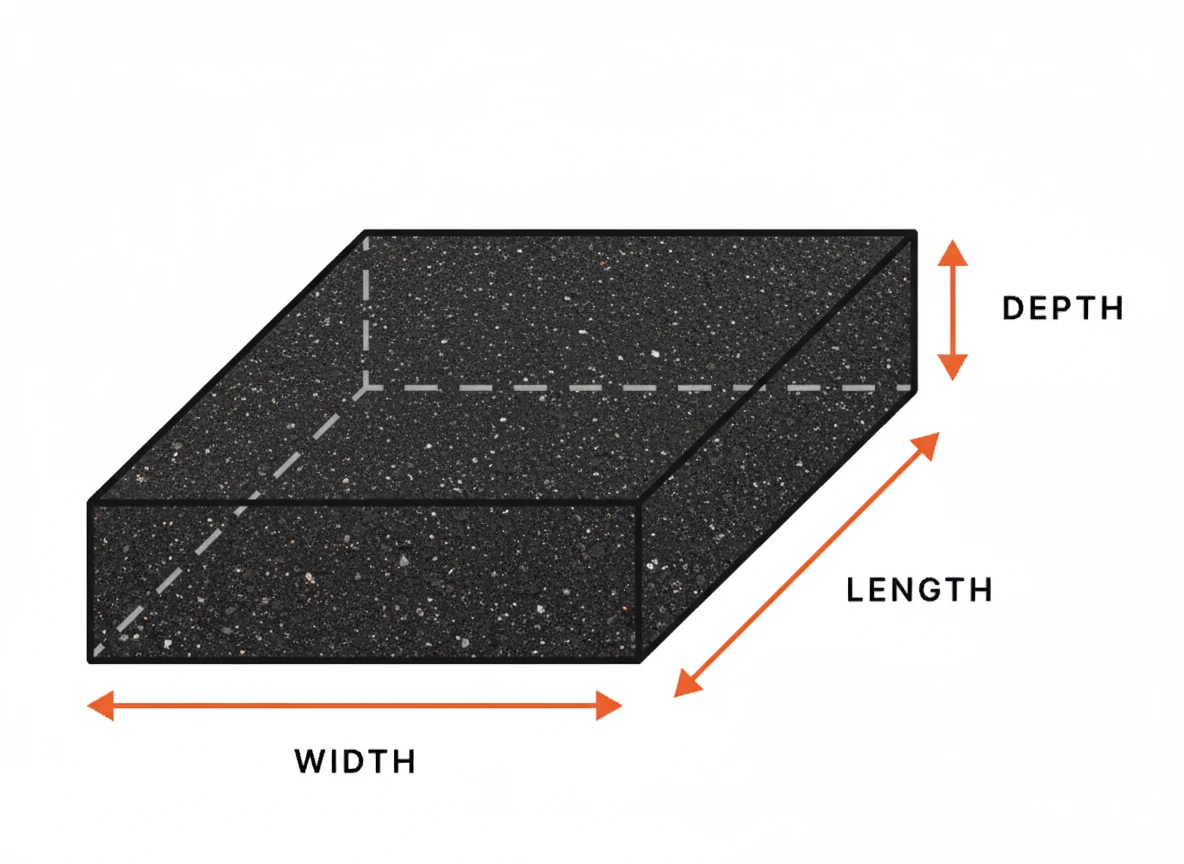Understanding Asphalt Materials
Learn about different asphalt types and their properties for accurate calculations. Our construction calculator uses industry-standard density values for different asphalt types to provide reliable estimates for your paving project. Understanding material properties helps ensure accurate project planning.
Common Asphalt Types
- Hot Mix Asphalt (HMA): Most common type, heated to 300-350°F. Ideal for driveways, roads, and parking lots.
- Warm Mix Asphalt (WMA): Produced at lower temperatures (200-250°F), more environmentally friendly with similar durability.
- Porous Asphalt: Permeable surface allowing water drainage, perfect for sustainable stormwater management.
- Recycled Asphalt Pavement (RAP): Eco-friendly and cost-effective option using reclaimed materials.
Density Values
- Hot Mix: 145 lb/ft³ (2,320 kg/m³)
- Warm Mix: 142 lb/ft³ (2,275 kg/m³)
- Porous: 135 lb/ft³ (2,160 kg/m³)
- Recycled: 140 lb/ft³ (2,240 kg/m³)
*Densities may vary based on aggregate type and mix design
Professional Paving Project Tips
Essential guidelines for successful asphalt paving projects.
Before You Start
- • Order 5-10% extra material for waste and compaction
- • Ensure proper base preparation and drainage
- • Check local weather - avoid rainy or cold conditions
- • Obtain necessary permits for your project
Installation Best Practices
- • Compact base material to 95% density minimum
- • Install asphalt at optimal temperature (275-300°F)
- • Use proper rolling techniques for even compaction
- • Allow 24-48 hours before heavy traffic
Common Asphalt Projects
Examples of typical asphalt projects and their requirements.
Residential Driveways
Estimate material for home paving projects. Typical residential driveways range from 200-800 square feet with 2-3 inch thickness.
- • Standard thickness: 50-75mm (2-3 inches)
- • Average size: 20m × 4m (65ft × 13ft)
- • Material needed: 2-4 tons typically
Commercial Parking Lots
Calculate asphalt requirements for commercial spaces. Parking lots require thicker asphalt due to heavy traffic loads.
- • Standard thickness: 75-100mm (3-4 inches)
- • High-traffic areas: 100-150mm (4-6 inches)
- • Requires proper base preparation
Road Resurfacing
Determine material needs for road repair and resurfacing projects. Overlay thickness depends on existing pavement condition.
- • Overlay thickness: 25-50mm (1-2 inches)
- • Full depth: 100-200mm (4-8 inches)
- • Requires traffic management planning
Asphalt Density Reference Table
Reference values for different asphalt types used in calculations.
| Asphalt Type | Density (lb/ft³) | Density (kg/m³) | Best Use |
|---|---|---|---|
| Hot Mix Asphalt (HMA) | 145 | 2,320 | Driveways, roads, parking lots |
| Warm Mix Asphalt (WMA) | 142 | 2,275 | Eco-friendly projects |
| Porous Asphalt | 135 | 2,160 | Drainage applications |
| Recycled Asphalt (RAP) | 140 | 2,240 | Budget-conscious projects |
*Densities may vary based on aggregate type, mix design, and compaction level. Always verify with your supplier.
Common Mistakes When Estimating Asphalt
Avoid these common errors when calculating asphalt requirements.
Calculation Errors
- ✗Ignoring compaction loss
Always add 5-10% extra material to account for compaction and waste.
- ✗Using inconsistent units
Mixing metric and imperial measurements leads to costly errors.
Project Planning Errors
- ✗Underestimating base preparation cost
Base prep can cost 30-50% of total project budget.
- ✗Not accounting for temperature changes
Asphalt volume changes with temperature during transport and laying.
Eco-Friendly Asphalt Options
Sustainable alternatives for environmentally conscious paving projects.
Sustainable Alternatives
Warm Mix and Recycled Asphalt reduce CO₂ emissions and resource use while maintaining performance. Consider these sustainable alternatives for eco-conscious projects.
- • Warm Mix Asphalt: 20-40% less energy consumption
- • Recycled Asphalt: Up to 80% recycled content
- • Porous Asphalt: Reduces stormwater runoff
Environmental Benefits
Ready to Start Your Paving Project?
Use our professional asphalt estimator above to get accurate material calculations. For complex projects, consult with local paving contractors for detailed quotes and professional installation.
